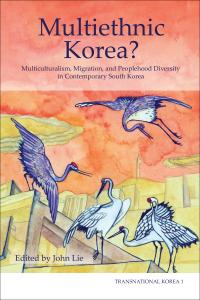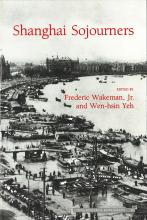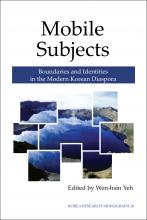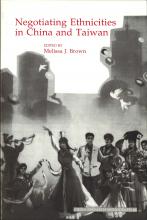Multiethnic Korea?
Multiethnic Korea?
John Lie, ed.
By the late 1990s and early 2000s, South Korean government sponsorship of cultural globalization had valorized “multiculturalism” (tamunhwa), but did not dispel widespread discrimination and xenophobia against actual multiethnic and multicultural populations. This volume's contributors employ the dual concepts of “multicultural” and “multiethnic” to make sense of an intriguing facet of recent and continuing South Korean social transformation.
As a nonprofit academic press, we need your support to publish our books. Your gift can help us make more of our titles available as e-books. DONATE NOW
Title information
The myth of monoethnic and monocultural Korea is tenacious. In the aftermath of Japanese colonialism, it found renewed strength in the Park Chung Hee era and in South Korean cultural nationalism of the 1980s. By the late 1990s and early 2000s, government sponsorship of cultural globalization valorized the idea of “multiculturalism” (tamunhwa), but did not dispel widespread discrimination and xenophobia against actual multiethnic and multicultural populations. The contributors to this volume employ the dual concepts of “multicultural” and “multiethnic” to make sense of an intriguing facet of the recent and continuing South Korean social transformation. This is the first English-language book of its kind to address multiculturalism in South Korea.
Contributors:
Nancy Abelmann is associate vice chancellor for research (Humanities and Arts) and the Harry E. Preble Professor of Anthropology, Asian American Studies, and East Asian Languages and Cultures at the University of Illinois at Urbana-Champaign. She writes on family, class, gender, education, and migration with a focus on South Korea and Korean/Asian America.
Hae Yeon Choo is an assistant professor of sociology at the University of Toronto. Her research centers on gender, migration, and citizenship. Intersectional analysis empirically informs her articles in Gender & Society and Sociological Theory.
Gayoung Chung is a doctorate student in the Department of Education Policy, Organization, and Leadership at the University of Illinois at Urbana-Champaign. Her current research is on the activism of undocumented Korean American youths struggling to navigate their life within the intertwined tension of restricted citizenship and racial stereotype.
Sue-Je L. Gage is an assistant professor in anthropology at Ithaca College. Her specialization is the lives, histories, and experiences of “mixed” Koreans known as Korean “Amerasians” in South Korea and in the United States.
Sejung Ham is a Ph.D. candidate in the Department of Educational Policy Studies at the University of Wisconsin-Madison. Her research focuses on the imaginaries of the “global citizen” at American universities in a global context.
EuyRyung Jun, an anthropologist, received her Ph.D. from the University of North Carolina at Chapel Hill in 2011 and is now a collegiate assistant professor in the Division of Humanities and Social Sciences at Pohang University of Science and Technology (POSTECH), South Korea. Her current research focuses on the emergence of the discourse of animal welfare and its broad implications in the governance of South Korea’s society.
Jin-Heon Jung is a research fellow and the Seoul Lab coordinator at the Max Planck Institute for the Study of Religious and Ethnic Diversity in Göttingen, Germany. He works on Korean Christianity with a focus on North Korean migration in the context of Seoul and late–Cold War Northeast Asia.
Jiyeon Kang is assistant professor of Communication Studies and Korean Studies at the University of Iowa. Jiyeon’s research focuses on the civic use of the internet, globalization, and South Korean youth and politics.
Eleana Kim is an associate professor of Anthropology at University of California-Irvine. She is the author of Adopted Territory: Transnational Korean Adoptees and the Politics of Belonging, which won the James B. Palais Prize from the Association of Asian Studies and the Social Science book award from the Association of Asian American Studies, both in 2012.
Minjeong Kim is an assistant professor of sociology at San Diego State University. She studies global gender issues, international marriage migration, migrant families, Asian American studies, and the mass media, and her ongoing research focuses on the state-family dynamics in the process of immigrant incorporation.
Nadia Y. Kim is associate professor of sociology at Loyola Marymount University. Kim researches “race”/ethnicity/nation, gender/relationality, citizenship, immigration/transnationalism, community politics, Asian American studies, and Korean and Korean American studies.
Nora Hui-Jung Kim is an assistant professor of sociology at the University of Mary Washington. Her research interests include international migration, multiculturalism, race and ethnicity, nationalism, citizenship, and East Asia.
Jack Jin Gary Lee is a doctoral candidate in sociology at UCSD, and his fields of interest are political sociology, the sociology of law, and global and transnational sociology. Lee’s research focuses on the social consequences of jurisdictional politics in relation to state formation.
Q-Ho Lee is a Ph.D candidate in anthropology at the University of Illinois at Urbana-Champaign. His research project is subjectivity formation of patients with chronic illness and the social dynamics of citizenship and biopolitics in Singapore.
John Lie teaches social theory at the University of California, Berkeley. His publications on South Korea include Han Unbound: The Political Economy of South Korea (Stanford university Press) and K-pop: Popular Music, Cultural Amnesia, and Economic Innovation in South Korea (University of California Press).
Timothy C. Lim is a professor of political science at California State University, Los Angeles. His most recent book is Politics in East Asia: Explaining Change and Continuity (Rienner, 2014).
John D. Skrentny is professor of sociology and co-director of the Center for Comparative Immigration Studies at the University of California-San Diego. His research presently focuses on the politics of immigration reform in the United States; immigration policy variations in East Asia and Europe; and the dynamics of employer demand for scientists and engineers.
Keiko Yamanaka lectures in the Department of Ethnic Studies and in International and Area Studies at the University of California, Berkeley. Currently, she is interested in the social incorporation of marriage migrant women in rural Japan.
John Lie, ed.
John Lie (pronounced "Lee") is professor of sociology at the University of California, Berkeley. He studies Korean diasporic trajectories and rethinks the categories of modern peoplehood. His recent works include Zainichi (Koreans in Japan): Diasporic Nationalism and Postcolonial Identity (UC Press, 2008) and an edited volume, Multiethnic Korea? Multiculturalism, Migration, and Peoplehood Diversity in Contemporary South Korea (IEAS, 2015).
A.B. in Social Studies, Harvard University; Ph.D. in Sociology, Harvard University
Multiethnic Korea?
Preface – vii
Contributors – ix
1. Introduction: Multiethnic Korea —1
John Lie
Part I: An Emergent Multiethnic Multicultural Society?
2. Late Migration, Discourse, and the Politics of Multiculturalism in South Korea: A Comparative Perspective —31
Timothy C. Lim
3. Korea: Multiethnic or Multicultural? —58
Nora Hui-Jung Kim
4. Tolerance, Tamunhwa , and the Creating of the New Citizens —79
EuyRyung Jun
5. Makeshift Multiculturalism: The Transformation of Elementary School Teacher Training —95
Nancy Abelmann, Gayoung Chung, Sejung Ham, Jiyeon Kang, and Q-Ho Lee
Part II: Migrants and Others
6. The Needs of Others: Revisiting the Nation in North Korean and Filipino Migrant Churches in South Korea—119
Hae Yeon Choo
7. North Korean Migrants in South Korea: From Heroes to Burdens and First Unifiers —142
Jin-Heon Jung
8. Beyond Motherlands and Mother Love: Locating Korean Adoptees in Global Korea —165
Eleana Kim
9. Diverging Paths, Converging Ends: Japan’s and Korea’s Low-Skilled Immigration Policies, 1990–2010 —184
Keiko Yamanaka
Part III: Diversifying Korea
10. Race-ing toward the Real South Korea: The Cases of Black-Korean Nationals and African Migrants —211
Nadia Y. Kim
11. Almost Korean: Korean Amerasians in an Era of Multiculturalism —244
Sue-Je L. Gage
12. Can the Union of Patriarchy and Multiculturalism Work? Family Dynamics in Filipina-Korean Rural Households —277
Minjeong Kim
Part IV: Coda
13. Korean Multiculturalism in Comparative Perspective —301
Jack Jin Gary Lee and John D. Skrentny
Index —331
|
JOURNAL REVIEWS |
|
“In his introduction, Lie argues that race and ethnicity are dynamic notions that locate populations in the process of politics and social history. The other authors take this idea and carry it to some surprising conclusions. The result is both a theoretically and ethnographically important volume, and it is a must-read for those studying Korean culture or East Asian societies. It also will be of pertinent interest to people studying ethnicity and race who want to add a comparative perspective to that which dominates the literature emerging from societies in the West.” ~Nobuko Adachi, Illinois State University, in American Ethnologist 43, no. 3 (August 2016): 575-576. doi:10.1111/amet.12360 |
|
"As a comprehensive and important collection of research on Korean peoplehood, this edited volume pushes us to think about and recognize co-ethnic Korean migrants, migrants who form families in South Korea, and people with partly Korean ethnicities. It is intended to be useful for advanced undergraduate and graduate courses on Korea, international migration, ethnicity, and East Asia. The book will also provide insights not only for Koreanists and Asianists, but also for scholars in the fields of migrants, globalization, sociology, comparative politics, and policy." ~Claire Seungeun Lee, University of Massachusetts, Boston, in Asian Ethnology 75, no. 2 (2016): 498–501. |
|
"Although much has been written in Korean on multiculturalism in Korea over the past decade or so, there is a lack of similar scholarship in English. "Multiethnic Korea?" makes a good start at addressing this lack, identifying the challenges that Korea faces on both the policy and personal levels as the nation moves into an increasingly diverse future. The conversation on multiculturalism cannot be dominated by any one voice, and it is hoped that this volume will inspire and encourage open dialogue between all those involved." ~ Charles La Shure and Lee Woo-young, in Koreana (Winter 2015): 74. |
|
"Multiethnic Korea? is essential reading for scholars interested in the broad field of Korean Studies and, indeed, thanks to its accessible, jargon-free language, any critical reader who is interested in unpacking the contemporary 'multicultural' landscape of Korea. Although most of the chapters are oriented toward the social sciences, their applicability may be extended to the humanities, particularly as multicultural residents are becoming a visible presence in the Korean media. Each chapter is insightful as a stand-alone piece, but their significance grows when considered in relation to each other, especially as the contributors tend to cite each other, engaging in productive dialogues." ~Eun-hae Kim, Yonsei University, in Situations 10.1 (2017): 153–158. |
|
"The book rightly revels in the contradictions and inconsistencies in a lot of the current beliefs in, and policies of, multiculturalism. It is with this kind of well-researched and critical literature that barriers to a genuine multiethnicity and multiculturalism in Korea might be lifted." ~Iain Watson, Ajou University, Suwon, South Korea, in Pacific Affairs 90, no. 2 (July 2017): 374–376. |




